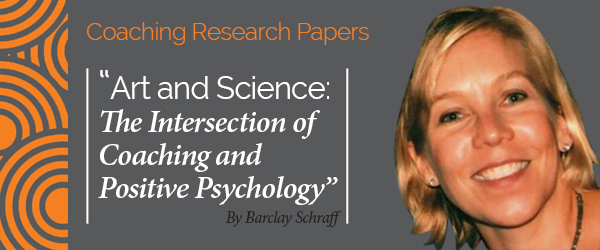
Research Paper By Barclay Schraff
(Health and Wellness Coaching, UNITED STATES)
The broad goals of positive psychology and coaching are quite similar. Both fields endeavor to help people thrive. Like coaching, positive psychology is a burgeoning field yet neither are yet established in the mainstream. This paper examines the research and opinions on the relationship between the two fields, and explores how they can work together to promote greater well-being among the human population. It also includes recommendations for empirically tested assessments and effective coaching tools with a positive psychology bent.
What is Positive Psychology?
Positive psychology is a young offshoot of the science of psychology. Martin Seligman, PhD, is considered the father of the movement. After decades of practicing as a clinical psychologist, Seligman recognized that the methods used by therapists could achieve some measureable success in alleviating depression and anxiety. However, although clients were relieved from many of their symptoms and negative emotions, they were left with a feeing of emptiness. Happiness and well-being did not rush in to fill the void. He concluded that the skills needed to alleviate suffering were entirely different from those helpful in cultivating well-being. As a result, Seligman and his colleagues created a large body of research that has led them to develop tools and assessments to build the skills of flourishing.[i] His early research yielded the Authentic Happiness Model. Seligman’s most recent publication, Flourish, reexamines this model, and expands its scope. The result is his Well-Being Theory whose goals is
to increase the amount of flourishing in your own life and on the planet.[ii]
In essence, traditional cognitive therapy only goes so far in ameliorating the negative states of depression and anxiety. The addition of positive psychology is the key to the cure.